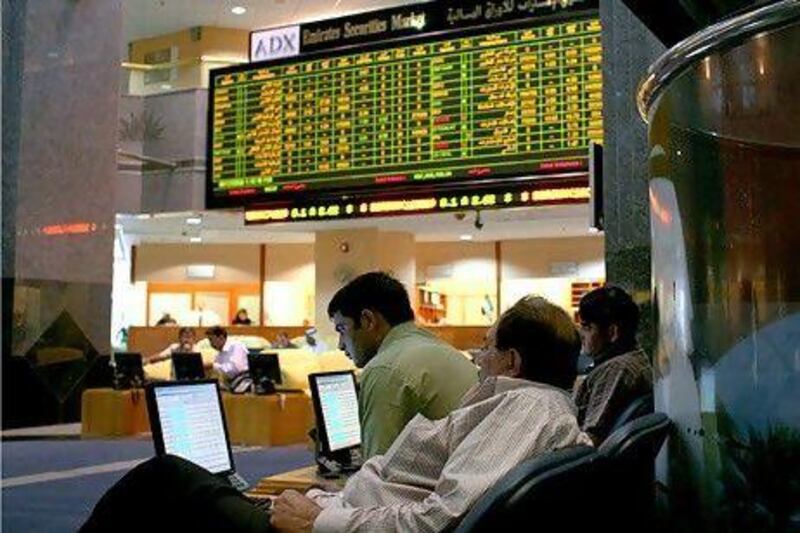Regional investors will be eyeing the UAE's banks this week.
InvestBank, one of the country's smallest lenders and based in Sharjah, reported last week a full-year profit of Dh317 million, an increase of 5.4 per cent on the previous year, while the bank's board announced a 10 per cent cash dividend and an 8.3 per cent distribution of bonus shares. InvestBank's shares jumped 6.2 per cent on Thursday.
Investors are eagerly awaiting fourth-quarter results from the rest of the sector, although the bigger banks are not expected to replicate the same kind of growth.
"No fireworks here," said Saleem Khokhar, the head of equities at National Bank of Abu Dhabi. "Provisions and non-performing loans are expected to remain in focus, with attention on corporate-sector loans, from retail lending previously."
The UAE stock markets underperformed most Gulf markets last year. The Abu Dhabi bourse fell by 11.6 per cent, while the Dubai index declined by 16.9 per cent.
RAK Bank is expected to report its fourth-quarter earnings today, and other lenders are due to follow.
Emirates NBD, the country's biggest bank by assets, is expected to show a 57.6 per cent drop in fourth-quarter profit to Dh172.1m, according to analysts polled by Reuters. The bank reported a profit of Dh406.4m in the same period a year earlier.
National Bank of Abu Dhabi, the second-biggest lender in the country, is forecast to show a 3.3 per cent increase in profit to Dh756.4m for the fourth quarter. The lender made 731.7m in the same period in 2010.
Abu Dhabi Commercial Bank, the country's third-biggest lender, is predicted to post a fourth-quarter profit of Dh569.9m versus Dh372m in the corresponding period a year earlier.
Abu Dhabi Islamic Bank, the country's second-biggest Sharia-compliant lender, is expected to report a profit of Dh223.5m versus Dh114 in the same period a year earlier.
Despite the price drops last year, many investors held on to their stocks with the expectation of dividend yields of 4.5 to 5 per cent.
"The expectations for strong dividend payments are quite high," Mr Khokhar said. "Markets are expecting companies to pay out, and if they are disappointed, you will see a sell-off in those stocks." First Gulf Bank has reported increased trading recently after JPMorgan Chase said the lender controlled by Abu Dhabi might pay a higher dividend for last year.
"Most of these banks should be able to pay out dividends because their capital adequacy ratios are quite high," said Haissam Arabi, the chief executive at the asset manager Gulfmena Investments in Dubai.
Investors will be looking for cues from Dana Gas as it reports its fourth-quarter results on January 31. Dana's shares tumbled 17 per cent last week amid uncertainty over how the company intended to repay its US$1 billion convertible sukuk when it matures in October.
Dana Gas calmed speculation when it said on Tuesday that "over the last four years [it] has timely and consistently paid on or before the due date the sukuk profit amount and will continue to do so pursuant with its obligations".
Investors, however, are still concerned.
"Dana Gas's sukuk is widely held by institutional funds and foreign investors," Mr Khokhar said. "The company needs to be more transparent in the event that anything should happen."
Elsewhere in the region: Kuwait's measure was up 0.5 per cent at 5,798.50 at the close trading last week; Oman's MSM 30 Index was down 1 per cent to 5,582.06 on the week; and Qatar's QE Index lost 2 per cent to close out the week at 8,461.77. The Saudi Tadawul All-Share Index rose 1.3 per cent to 6,464.17 yesterday.






